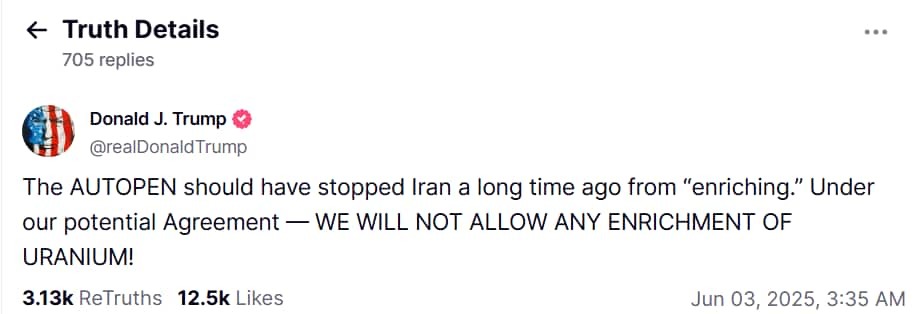
Suspense crime, Digital Desk : Former U.S. President Donald Trump recently made a bold claim about any potential new nuclear agreement with Iran: absolutely no uranium enrichment would be permitted. However, this strong stance appears to directly contradict a recent media report suggesting that a U.S. proposal currently on the table would, in fact, allow Iran to enrich uranium up to 60% on its own soil.
Trump, who pulled the U.S. out of the 2015 Iran nuclear deal (known as the JCPOA) during his presidency, has consistently advocated for a complete halt to Iranian enrichment activities. He reiterated this on his Truth Social platform, stating "NO ENRICHMENT!" was always his administration's bottom line.

But a joint report from Iran International and The Jerusalem Post, citing unnamed sources, paints a very different picture of current U.S. diplomatic efforts. According to this report, the Biden administration has proposed an "interim deal" or a "political ceasefire." A key, and controversial, element of this alleged proposal is that Iran would be allowed to continue enriching uranium to 60% purity – a level very close to what's needed for nuclear weapons – within its own borders.
The original 2015 JCPOA allowed Iran limited enrichment in exchange for the lifting of international sanctions. Trump's withdrawal aimed to force Iran into a tougher deal that would more severely restrict its nuclear program and address other issues like its ballistic missile development and regional influence.
The reported new U.S. proposal is described as a "freeze for freeze" arrangement. This would supposedly involve Iran halting its enrichment activities at the current 60% level. In return, the U.S. would reportedly unfreeze billions of dollars in Iranian assets currently held in countries like Iraq, South Korea, and by the International Monetary Fund (IMF).
Further conditions reportedly include Iran ceasing attacks by its proxy forces on U.S. contractors in Syria and Iraq, and committing to greater cooperation with the International Atomic Energy Agency (IAEA), the UN's nuclear watchdog. Iran would also supposedly pledge not to target U.S. citizens, including former officials.
This stark difference between Trump's assertion of "no enrichment" and the reported details of a U.S. offer allowing significant enrichment highlights the ongoing complexities and sensitive nature of negotiations surrounding Iran's nuclear ambitions. If the report is accurate, it signifies a considerable departure from the maximalist position Trump championed, potentially creating a new dynamic in the efforts to prevent Iran from developing nuclear weapons.
Read More: Beyond the Durand Line Why the Pakistan-Afghanistan Border is Reaching a Breaking Point

 Share
Share


_853562307_100x75.jpg)
_1063032679_100x75.jpg)